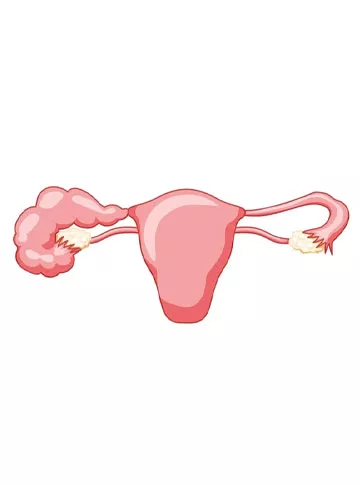What is Hydrosalpinx?
Hydrosalpinx is a term used to describe a condition where one or both fallopian tubes become blocked and distended with a clear or serous fluid. The blockage prevents the egg from travelling down the tube, making it difficult for a woman to conceive naturally. The fluid accumulation can cause the tube to swell, creating a characteristic appearance that resembles a "water bag," hence the term "hydrosalpinx."
Who can get Hydrosalpinx?
Hydrosalpinx can affect women of reproductive age. It is often associated with pelvic inflammatory disease (PID), a previous history of sexually transmitted infections (STIs), endometriosis, or previous pelvic surgeries. Women undergoing fertility treatments may also be diagnosed with hydrosalpinx during the fertility evaluation process.
What are the Types of Hydrosalpinx?
There are two main types of hydrosalpinx:
1.Unilateral Hydrosalpinx: This occurs when only one fallopian tube is blocked and filled with fluid.
2.Bilateral Hydrosalpinx: In this case, both fallopian tubes are blocked and distended with fluid.
What are the Causes of Hydrosalpinx?
The primary causes of hydrosalpinx are related to infections and inflammation within the reproductive system. Common causes include:
- Pelvic Inflammatory Disease (PID): Often caused by untreated or inadequately treated sexually transmitted infections (STIs) such as chlamydia or gonorrhoea.
- Endometriosis: A condition where the tissue lining the uterus (endometrium) grows outside the uterus.
- Adhesions and Scar Tissue: Previous pelvic surgeries, appendicitis, or other abdominal surgeries can lead to adhesions that block the fallopian tubes.
- Previous Ectopic Pregnancy: An ectopic pregnancy that occurs in the fallopian tube can cause damage and blockage.
- Use of Intrauterine Device (IUD): Long-term use of IUD may cause PID and increase the risk of developing hydrosalpinx.
What are the Symptoms of Hydrosalpinx?
Hydrosalpinx often does not present with noticeable symptoms. However, some women may experience:
- Pelvic Pain: Dull or moderate pelvic pain may be present, particularly during menstruation or intercourse.
- Abnormal Vaginal Discharge: Some women may notice an unusual vaginal discharge.
- Fertility Issues: Difficulty conceiving or recurrent miscarriages can be indicative of hydrosalpinx.
How does Hydrosalpinx affect Female Fertility?
Hydrosalpinx is a condition where a fallopian tube is blocked and filled with fluid. This can occur due to infection, endometriosis, or other factors.
How is Hydrosalpinx Diagnosed?
Diagnosing hydrosalpinx typically involves a combination of medical history review, physical examination, and imaging studies. Diagnostic procedures include:
- Transvaginal Ultrasound: This imaging technique helps visualise the reproductive organs and identify any fluid-filled fallopian tubes.
- Hysterosalpingography (HSG): An X-ray procedure where a contrast dye is injected into the uterus and fallopian tubes to detect blockages.
- Laparoscopy: A surgical procedure where a small camera is inserted into the abdomen to directly view the fallopian tubes and diagnose hydrosalpinx
How is Hydrosalpinx Treated?
The treatment of hydrosalpinx is aimed at relieving symptoms, improving fertility, and preventing recurrence. Treatment options may include:
- Surgery: Laparoscopic surgery to remove the affected fallopian tube (salpingectomy) can be performed to alleviate symptoms and enhance fertility.
- In-Vitro Fertilization (IVF): If both fallopian tubes are severely affected, IVF may be the best option for achieving pregnancy.
- Antibiotics: If the hydrosalpinx is caused by an active infection, a course of antibiotics may be prescribed.
Conclusion
Hydrosalpinx is a condition that can significantly impact a woman's reproductive health and fertility. Understanding its causes, symptoms, and available treatment options is crucial for individuals dealing with this condition. Seeking timely medical attention and exploring appropriate treatments can make a significant difference in managing hydrosalpinx and achieving a successful pregnancy.
Pregnancy Calculator Tools for Confident and Stress-Free Pregnancy Planning
Get quick understanding of your fertility cycle and accordingly make a schedule to track it















